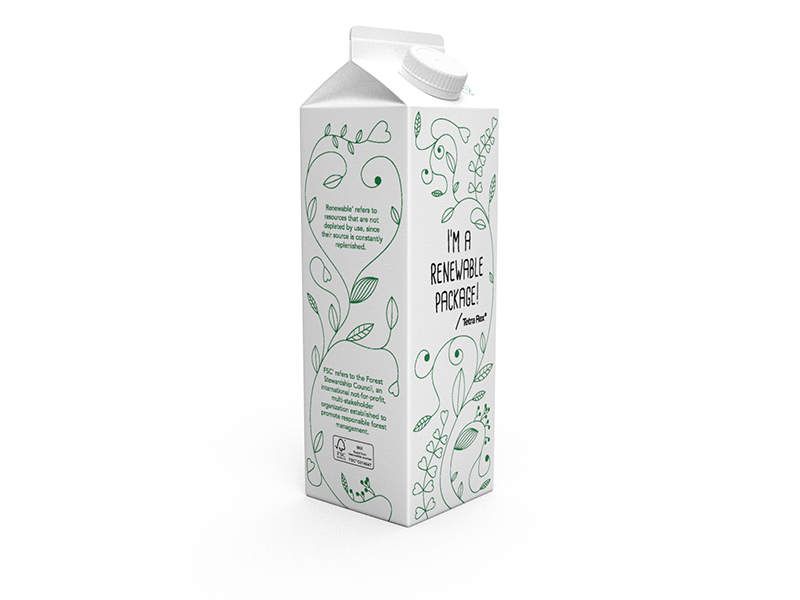

Image: The new Tetra Rex carton showcases the brand's commitment to sustainability. Photo: courtesy of Tetra Pak
In January 2015, packaging giant Tetra Pak launched their renewable packaging offering called the Tetra Rex Bio-based milk carton. By February 2016 the company announced that they planned to deliver more than 100 million of the packages to customers, a testament to the strong demand for the solution.
Made entirely from plant-based materials, the Tetra Rex has gained popularity among consumers across Finland, Sweden and Norway, with brands such as Valio, Arla Foods, Vermlands Mejeri and TINE using the package. Commenting on the success of the renewable package Charles Brand, executive vice-president product management and commercial operations at Tetra Pak said: “We are proud to be the first company to deliver a package made entirely from plant-based materials. Every package is traceable to its origin, helping customers to enhance their brand and communicate with consumers. This is a significant milestone in Tetra Pak’s long term ambition to provide 100% renewable packaging across our product portfolio.”
Inside Packaging went to the Tetra Pak factory in Lund, Sweden to learn more about the Tetra Rex Bio-based package, as well as learning how the company is implementing other strategies across the globe to further drive down their message.
Renewability and sustainability
There are three global drivers that are shaping the business environment and which, ultimately, brought the Tetra Rex Bio-based package to fruition. Climate change, resource depletion and population growth have meant that sustainability has been at the forefront of any product innovation. In the case of the Tetra Rex packaging solution, that has meant that the carton is fully renewable. The paperboard of the Tetra Rex package is made from Forest Stewardship Council certified wood fibres, whilst the TwistCap OSO 34 closure and the packaging material coating are made from renewable polyethylene, which comes from sugar cane.
There are no fossil components in the package as they have all been secured by physical segregation between fossil and bio-based plastics. There is also no difference in the recycling waste stream as the same process is used. Customers are also leaning towards the renewable package as 73% of consumers globally say they would pay 5% premium or more to buy milk in an environmental package.
Global dairy company Arla Foods have adopted the Tetra Rex for their products as they launched a range of organic milk in the package to provide their consumers with a sustainable package, increasing the share of renewable and recyclable packaging material. Furthermore, they also implemented the TwistCap closure on all their standard gable top packages sold across Sweden.
Greta Björnöy Product Manager Milk at Arla Foods said: “Arla Foods has a target to reduce the climate impact from our packaging and we want to increase the share of renewable and recyclable packaging material. The bio-based carton delivers on all these goals. Eko is Arla Food’s Swedish organic product line and offers many added values from a sustainability perspective. Improving the packaging even further from a sustainability perspective was a logical choice.”
Building a solid foundation for development
By 2020, Tetra Pak are hoping to provide customers with a 100% renewable package and throughout 2016 the conglomerate will be rolling out more strategies, including expanding to other countries that have already shown interest in the package, in addition to looking at other packaging specifications beyond milk-based products.
The brand says that protecting food means securing futures and one way this has been incorporated into communities is through dairy hubs, which were launched in 2009 and school feeding programmes. Dairy hubs have proved popular in countries such as Bangladesh, Kenya, Nicaragua, Senegal, Sri Lanka and Nigeria. These schemes bring together thousands of smallholder farmers from across a specific region, link them with dedicated dairy processors and provide them with training, expert advice and modern facilities, with the aim of improving both yields and quality. For the farmers, it means an improved livelihood and for the local community, it means better access to safe, affordable milk.
Commitment to excellence
The Tetra Rex Bio-based package is moving the brand one step closer to their commitment to excellence. Its sustainability goal is built upon the brand’s promise which focuses on food, people and futures. The company explains saying: “We are driven by our vision to make food safe and available, everywhere. Our innovative and market-leading processing and packaging solutions are making that vision a reality worldwide.
“We make social responsibility a priority when it comes to people. We seek to support communities wherever we operate and provide opportunities for our employees around the world. We strive to play an active role in shaping a better future, supporting the long-term success of our customers’ businesses and driving environmental excellence across our whole value chain.”
In 2014, more than 11 billion Tetra Pak packages reached low income consumers and 66 million children in over 50 countries received nutritious drinks or milk in one of the brand’s package through the school feeding programmes. In addition to this, 651,000t of used Tetra Pak cartons were recycled globally in 2014, up from 623,000 in 2013.
Dennis Jönsson, president and CEO at Tetra Pak said: “At Tetra Pak, our approach to sustainability derives from our brand promise: protect what’s good. Yes, that means protecting food, through our processing and packaging activities. But it also means protecting people, both inside and outside the company. And it means protecting futures: our planet’s, our customers’ and own.”



